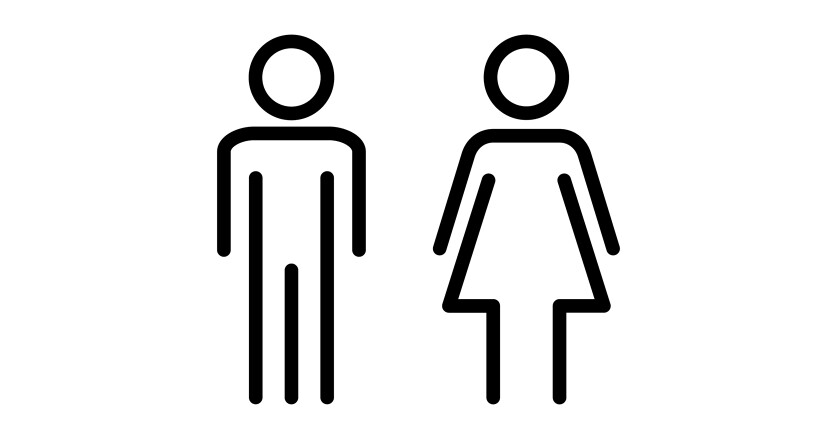Hoping to shut the door on uncomfortable conversations about gender expression, legislators in several states are drawing a line in the sand and establishing official state definitions for “man” and “woman.” It might be possible to dismiss such laws as political theater, but they amount to a body blow to members of the LGBTQ+ community.
“We call these the LGBTQ+ erasure bills,” says Cathryn Oakley, state legislative director and senior counsel for the Human Rights Campaign (HRC). Not only do they represent state denial of the legitimacy of living with gender identity different than assigned at birth, they can also undermine civil rights protections.
As an example, Oakley cites a Supreme Court ruling that prohibits employment discrimination on the basis of sex, outlined in Title VII of the Civil Rights Act, included discrimination based on sexual orientation and gender identity. If state law says there is no such a thing as a “transexual” person, protection against discrimination of the basis of their gender identity would not be assured.
This isn't a theoretical concern. In May, Montana Gov. Greg Gianforte signed a bill defining “sex” as only male or female. The bill also amends sections of state code prohibiting discrimination on the basis of sex in regard to pay, employment, housing, admission to hospitals, insurance, etc. — as well as codes relating to numerous other legal contexts — to incorporate the bill’s binary definition of "sex."
An analysis by the Legislature’s fiscal division showed that the bill had the potential to result in the loss of almost $7.5 billion in federal appropriations in FY 2023. It notes that this figure does not include cost of responding to lawsuits challenging the bill.
Views regarding gender identity as strictly male or female vary according to party affiliation. Four in ten Americans identify as "independent," with the remainder split evenly between Republican and Democratic parties.
Kansas and Tennessee have enacted similar legislation. In Alabama, the “What is a Woman Act,” which borrows its name from the 2022 online film by conservative political commentator Matt Walsh, is moving through the Legislature. It defines sex as “biological sex” at birth. (Straying somewhat from this emphasis on biology, it defines a “person” as “an individual, corporation, partnership, company or other business entity.”)
Scientists and physicians in states that have passed or proposed bills have protested that they ignore biological complexity and nuance, including the reality that some persons are born “intersex,” with physical, hormonal or chromosomal characteristics of more than one sex. (All men and women share 22 of their 23 pairs of chromosomes.)
“Science does not drive these policies; the desire to exclude does,” said anthropologist and bioethicist Katrina Karkazis in a Lancetcommentary on efforts to form policy around biological sex. Oakley believes the bills that are enacted will be “almost impossible” to implement. Even so, she expects to see more introduced next year as well as mounting legal challenges.
Attitudes in Flux
For the past three years, the annual Gender and Politics Survey conducted by the Public Religion Research Institute (PRRI) has seen the share of the public who believe there are only two gender identities increase gradually. In the 2023 survey, 65 percent expressed this view.
“We were surprised at the extent to which Americans have solidified their views on the gender binary,” says PRRI’s CEO Melissa Deckman. However, a deeper dive into responses to the survey reveals the extent to which views differ according to party affiliation, age or membership in religious institutions.
In 2023, Republicans (90 percent) were twice as like as Democrats (44 percent) to see gender as only male/female. White evangelical Protestants held this view almost unanimously (92 percent), compared to 69 percent of Catholics and 46 percent without any religious affiliation.
Unsupported claims that schools are “grooming” students, presenting content and ideas intended to make gender fluidity appealing, have been used to garner support for removing LGBTQ curriculum and books from schools.
PRRI found that Americans are almost evenly divided about whether there's anything to worry about. Fifty percent don’t think schools are giving students “harmful” information about sexual orientation and gender, but 49 percent do. Again, these attitudes vary greatly according to party: 8 in 10 Republicans fear this is happening, compared to 1 in 4 Democrats.
Although it has become a cultural flash point and a focus for restrictive legislation, transgenderism is an abstract concept to most people. Deckman notes that only 11 percent of Americans have a close personal relationship with a transgender person.
She sees this lack of exposure as a factor in acceptance; PRRI surveys have found that people with LGBTQ friends are more supportive of policies that advance the rights of this community.
“If you go back several decades there was not widespread support for same-sex marriage, or laws that prevented discrimination against gays and lesbians,” says Deckman. “As people have become far more familiar with and open about homosexuality there has been much greater acceptance for laws that protect the rights of those individuals.”
States may decide to legislate a binary view of sex, but the Supreme Court has ruled that the Constitution forbids discrimination on the basis of transgender status. It’s possible the findings of the 2023 survey are evidence of a sort of “backlash in the backlash,” Deckman says. “We’ll have to see where it goes.”
Not a Crisis
Patricia Todd, the first openly gay person elected to the Alabama Legislature, served in its House for 12 years. She sees the “What is a Woman” legislation as a distraction from the real problems her state faces.
“We have a prison crisis. We have a health-care crisis. And that’s what we need to be focusing on,” she told a local news outlet. “This is not a crisis in Alabama.”









